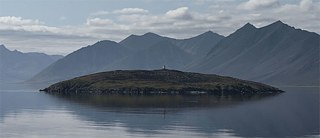Event series
Ulrike Ottinger: Chamisso’s Shadow

Ulrike Ottinger: Chamisso’s Shadow.
A Journey to the Bering Sea in Three Chapters
Please find the screening schedule further below.
Chamisso’s Shadow (2016), German avant-garde director Ulrike Ottinger’s filmic journey to the lands and people of the Bering Strait region will receive its UK premiere at the Regent Street Cinema over the weekend of Friday 20 – Sunday 22 July 2018. Divided into three chapters, the twelve-hour long film will be shown over three consecutive days and be complemented by introductions from the curator and lecturer Helen de Witt and Jean McNeill, writer-in-residence with the British Antarctic Survey (2005-6).
Inspired by the sea expeditions and writings of 18th and 19th century explorers and their accompanying naturalists, particularly Adelbert von Chamisso, this epic travelogue combines grand cinematography, detailed observations and a many-voiced commentary to create a unique ethnographically inflected documentary essay on the interplay of culture, politics and nature in this remote northern region between the Eurasian and American continents.
Known for such daring and outlandish films as Madame X – An Absolute Ruler (1978), Ticket of No Return (1979) or Freak Orlando (1981), Ulrike Ottinger has for many years also pursued a passionate interest in travelling and exploring the daily lives, customs, myths, and histories of different cultures across the globe, whether for example in Mongolia (Taiga 1991/92), eastern Europe (South East Passage (2002), or Korea (The Korean Wedding Chest, 2007). Chamisso’s Shadow is the result of one of her most recent voyages. In 2014, she undertook a three-month journey between Alaska and the Kamchatka Peninsula and north and south of the Bering Strait with the aim of learning more about the different ethnic groups in the region such as the Yupik, Itelmen, Evens, Chukchi, and the Aleuts, who all share living from and with the sea. An outstanding still photographer and camera woman, Ottinger captured people’s daily activities such as working, singing or dancing, taking her time to focus on recording old techniques and customs, while also filming plants and animals and opening up the perspective to take in breathtaking landscape views. Adding to the visual feast it provides, the film also offers the pleasure of letting us hear the sounds of nature and of the many indigenous languages spoken by the locals giving vivid accounts of their daily lives and histories.
The filmed and recorded material, maps and photographs Ottinger has gathered as well as quotes from her logbook are juxtaposed with the observations and thoughts of some of the explorers that inspired her journey, such as Alexander von Humboldt, Vitus Jonassen Bering, Georg Wilhelm Steller, Reinhold and Georg Forster, William Anderson, James Cook and the eponymous Adelbert von Chamisso. Passages spoken by actors and taken from logbooks and other writings by these travelling researches open up the gap between the past and the present. Their records and poignant reflections made in the 18th and 19th century highlight the impact that changing political systems, technical progress and economic developments have had on the region. Ottinger shows how subsistence fishery survives next to industrial fishing, how centuries interweave, time passes and yet stands still. Twelve hours of cinema float by and gain us centuries.
Germany 2016, colour, 718 mins., DCP, With English subtitles.
Screenplay, Direction and Camera: Ulrike Ottinger, Editor: Bettina Blickwede, Sound: Sascha Heiny, produced by Ulrike Ottinger (Ulrike Ottinger Filmproduktion), Udo Bemer (Redaktion ZDF/3Sat), Jens Stubenrauch (Rundfunk Berlin-Brandenburg), production company: Ulrike Ottinger Filmproduktion (Berlin)
When the film premiered at the Berlinale in 2016, it was shown in one day from 9am in the morning. Here in London its three parts will be shown over three days, with the longer chapter two shown on the 2nd day being divided by a break.
Presenting a 12 hour film always takes a little effort, and in this case it was only through the joined effort of the following partners that it could be organised: Birkbeck Institute for the Moving (BIMI), the Centre for Research and Education in Arts and Media (CREAM), the Goethe-Institut and LUX. With support from the Open City Documentary Film Festival, and in association with the German Screen Studies Network. We would like to thank the Regent Street Cinema for being the venue for this endeavor.
-
Chamisso's Shadow: Chapter 1 - Alaska and the Aleutian Islands
7:00 PM | Film Screening
-
Chamisso's Shadow: Chapter 2 - Chukotka and Wrangel Island
Film Screening
-
Chamisso's Shadow: Chapter 3 – Kamtchatka and Bering Island
2:00 PM | Film Screening